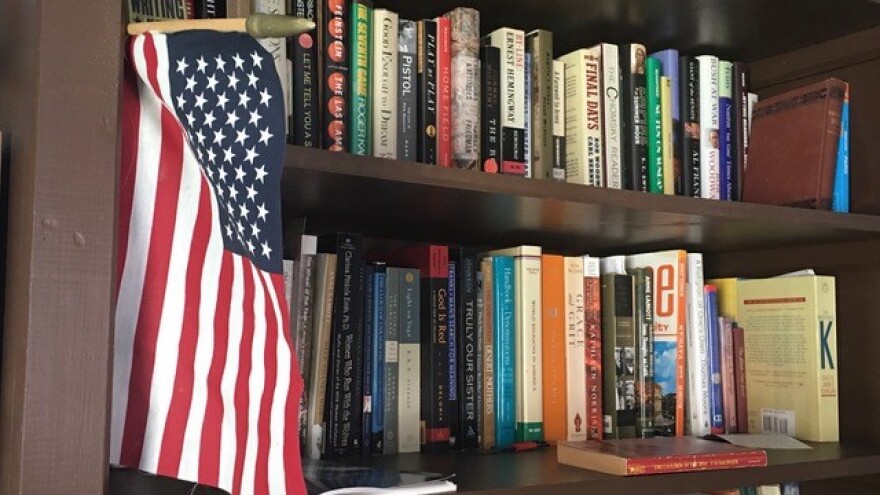The interview posted above is from SDPB's daily public affairs show, In the Moment with Lori Walsh.
It’s not a book I would have chosen for myself.
It was chosen for me, in an odd way.
I might never have known about it, except for the Rapid City Area Schools Board of Education, school administrators and their book ban.
Fun Home: A Family Tragicomic was one of the five books banned from optional use by senior students in a new English 12 class offered by the district.
You probably know the story. The books were among those chosen by teachers on a selection committee and ordered for use in the class. It was a hurried-up process, one that troubled some teachers on the initial selection committee enough that they withdrew.
Those who joined or continued on the committee did their best to find a selection of books for required and optional reading that would be entertaining, challenging and educational.
But before most of the five books in question were even taken out of the box, they were withdrawn and sent to the school warehouse by administrators, after a concerned parent and a teacher pointed out sexually explicit passages.
Imagine that in books about real life. Who would have figured?
Especially in these highly politicized times, the passages were seen as possible ignition points of controversy. So the books were pulled, without giving those who selected them a chance to argue in their defense. And administrators hoped the books and the potential fuss would quietly be moved into the district warehouse, out of student reach and probably on their way to destruction.
Except somebody talked, to a reporter. And the story came out, bit by bit.
Most recently, the Rapid City Journal added important facts and perspective to the story after pushing to get emails from administrators and others. The emails show first of all how important professional reporting is. Second, they show that a few administrators — including Superintendent Lori Simon — were the driving force behind the removal of the books.
Which is not to say the administrators weren’t influenced in some way by the current school board and the conservative philosophical inclinations of some members. Maybe. Maybe not. But I’d say probably. It just doesn’t show up that specifically in the emails obtained by the Journal, which were the basis of the story by staffer Siandhara Bonnet.
Emails show school board informed last August
The emails show that school board members were informed of concerns over one of the books -- How Beautiful We Were: A Novel by Imbolo Mbue -- last August. School board members had recently indicated they weren't aware of the book-removal controversy until this spring, after How Beautiful We Were and the four other books had been pulled by administrators.
How Beautiful We Were, by the way, is a story of a small African village and a strong-willed young woman who organizes resistance by villagers against an American oil company to stop environmental degradation. It was chosen one of the 10 best books of the year by the New York Times, Washington Post, Christian Science Monitor and Good Housekeeping, among others.
Of the author, USA Today said: “What a stunningly beautiful writer Mbue is, and how lucky we are to have her stories in the world.”
But not in the world of Rapid City Area schools, apparently. At least, not this story.
Along with How Beautiful We Were, administrators banned The Circle by Dave Eggers; The Perks of Being a Wallflower by Stephen Chbosky; Girl, Woman, Other: A Novel by Bernadine Evaristo; and Fun Home: A Family Tragicomic by Alison Bechdel.
We’ll get back to Fun Home in a minute. First, though, consider that all five books seemed set for destruction. If not burning, something like shredding. Whatever the method, the notion of book destruction outraged those who love books, support academic and literary freedom and even just believe in common-sense use of taxpayer dollars.
Once journalists got involved, the issue stopped grinding along in the dark basement of school bureaucracy and rose to prominence in the light of public scrutiny and discussion.
The board voted last month to delay action on the books and seek legal advice. Presumably the books remain in the district warehouse, and haven’t been destroyed.
The issue sort of went on summer vacation, along with the students. But emails obtained by the Journal show that Simon — who is leaving as superintendent after six years in the job — knew about and approved of pulling the books, beginning with How Beautiful We Were.
Parent’s objection begins process to ban books
Early last August, Simon forwarded an email to board members from a parent who was concerned about the book. Simon said in the email that district officials were made aware of "some sexually explicit content in a book" and after reading it, decided that the book wasn't appropriate for district students. To be clear, the district students being, well, “protected” were seniors.
Those five books were never intended to be used as required reading for English 12 students. They were optional. Seniors didn’t have to read them if they or their parents found them objectionable. Even so, administrators decided that all five, which have won literary awards, would be removed. According to the emails obtained by the Journal, the most prominent voice for the removal of the books was Valerie Seales, director of teaching, learning and innovation for the district. In one of the emails, Seales wrote to Colby Christensen, the district learning and teaching specialist, that "It sounds like there are additional books that are inappropriate for HS students." According to the emails, Seales requested a reading list from Christensen and followed up with emails to Simon and former Assistant Superintendent Mark Gabrylczyk that included a passage from How Beautiful We Were that describes a girl seeing her parents having oral sex in their kitchen. "I ordered that these books be returned to the warehouse," Seales wrote. "The reason I am bringing this to your attention is I think some English teachers are going to want to fight to keep the books. I am taking the stance that they are inappropriate and we will not use them for assigned or voluntary reading list. Let me know if you disagree.”
Apparently, there was no disagreement among administrators. The email also included an email from Stevens High School Principal Jocelyn Hafner who said that a teacher brought concerns about the book to her. Hafner said she believed parents in the district would object to passages in the book. "I don't believe this book should remain on the list of possible options for English 12," she wrote. As reported by The Journal, Simon responded to the email with one of her own, saying that she agreed the book should be removed.
Simon urges other administrators to avoid book controversy
"Now more than ever, what curriculum and resources/books we use will be subject to public scrutiny," Simon wrote. "Let's avoid issues proactively.”
Now more than ever? Maybe. There certainly is a move nationally by conservative Christians to get books they find objectionable banned in schools. And there is some of that mentality on the Rapid City board, although the recent election of some new members could help balance that.
Simon, who probably knew she was near the end of her time as head of the RC School district, was likely considering the board mentality and the national movement when she sided with the complaining parent and Seales and against the books and the teachers who had selected them. In trying to “avoid issues proactively,” however, Simon, the other administrators and at least some members of the school board set themselves up for a larger controversy over banning and even destroying books and what is appropriate for high-school seniors to have available for optional reading. They also demonstrated how important it is to have professional journalists hustling to bring to light issues that otherwise might have been handled outside of public view and discussion.
Which brings us back to Fun Home, and my gratitude to all those in the school district who created this fuss and gave me a chance to read a book I previously didn’t even know existed.
Do you know about “graphic novels”? I didn’t. You could also call them extended comic books, with a punch — sometimes to the gut.
I picked Fun Home for a couple of reasons. First, even some of the teachers I contacted thought Fun Home might have been pushing the edge of acceptance a bit. One of them said: “I at least wish we could have discussed the other four books separately from Fun Home. I probably wouldn’t have suggested that book for the class.”
OK, so Fun Home is on the outside edge of the five. That’s a pretty good one for me to read.
Second, I chose it because I have a reading disability that developed over a period of weeks more than a year ago. Doctors from here to Mayo and back are unsure of exactly what caused it, and treatment and meds offer minimal relief.
So I have to limit my reading. I’ve gotten to know Audible well, but traditional books are pretty much out of the question. Because of the book ban, I’ll make it a point to listen to audio versions of the other books. But I figured a “comic book” or “graphic novel,” even one of more than 200 pages, would be the easiest of the books for me to actually read.
It was. And it wasn’t.
Not like your father’s comic books
Of course, there are fewer words on each page of Fun Home. But the artwork, or cartoons if you will, are both complicated and splendid. And on each page, the drawings and the words demand to be studied.
In it’s own way, Fun Home is a test for the eyes and the mind.
Alison Bechdel is both a skilled artist and a talented story teller. The story she tells us and shows us is a memoir of her difficult growing-up years in a struggling family and her eventual realization that she is gay.
It is about difficult family dynamics, dysfunctional-yet-loving relationships, divorce and her father’s suicide. At least, we think it was suicide, and Bechdel explores that probability in painful and enlightening detail.
She also explores the revelation that her father, a high-school English teacher who also ran the family’s funeral home — ironically called Fun Home, since Bechdel and her brother sometimes played there — pushed her hard while she was growing up to be more girlish.
Her father also had many affairs with young men during his marriage to Bechdel’s mother, something Bechdel learns when her parents split up.
It’s a difficult, challenging story that can also be funny and sweet. And, yes, there are some sex scenes in it. There’s a picture or two that subtly show masturbation. And a couple of others that show Bechdel’s character having oral sex with her roommate in college.
So two or three pages out of more than 200 have sex scenes. And those are drawings. They’re not videos or graphic pictures. They’re cartoon-like drawings.
They’re hardly memorable. The book is, however.
Fun Home is a powerfully told story that expanded my understanding of what it must be like — or must have been like for the now-61-year-old Bechdel — to grow up Catholic in a small town in Pennsylvania.
I was entertained. I was challenged. I was educated.
That’s a pretty good combination of benefits from any book, don’t you think?


